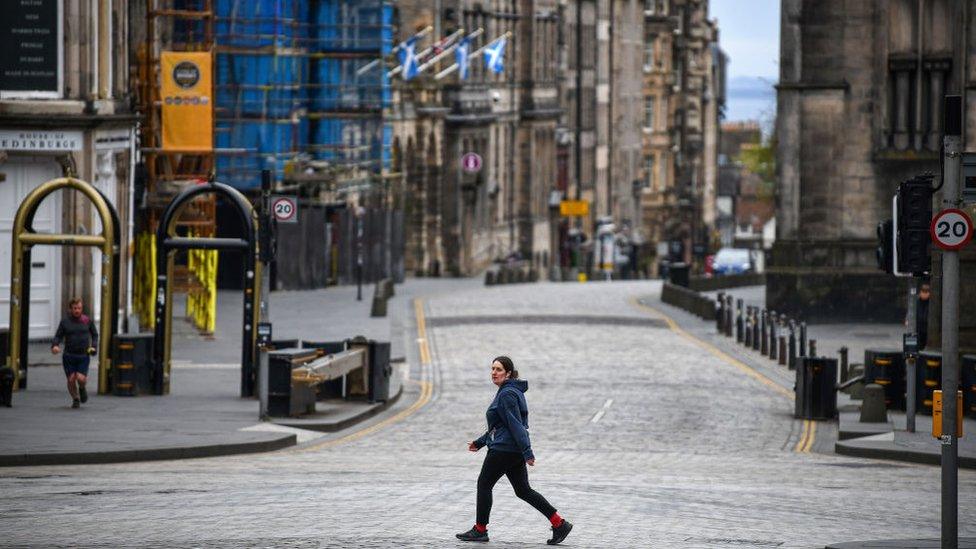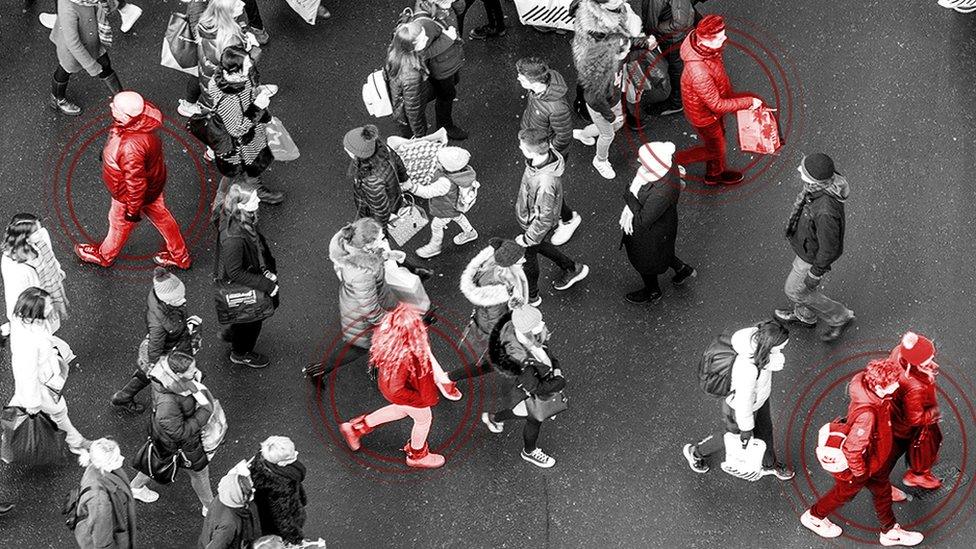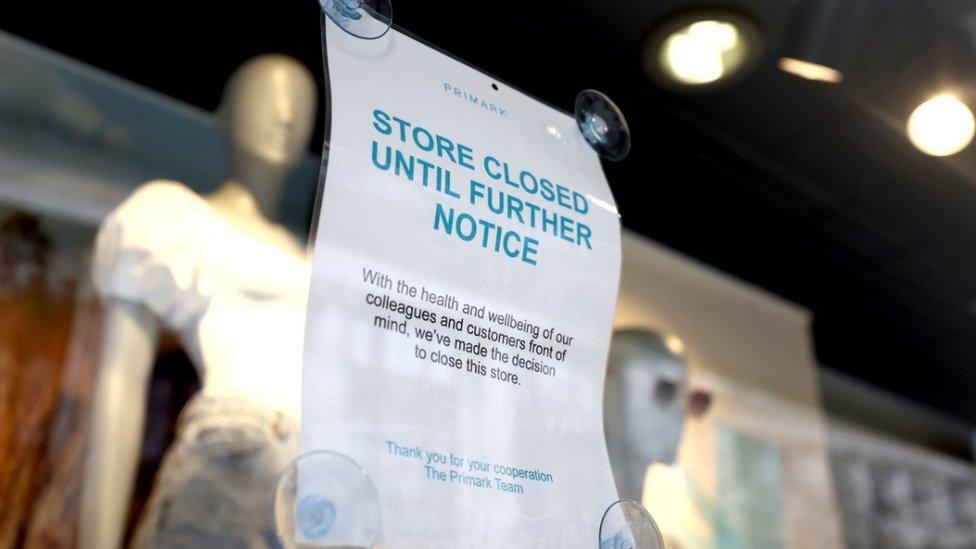Coronavirus: When this is over... what next after lockdown?
- Published

We're not supposed to be talking about an exit strategy, but isn't it inevitable and wise that we should? There are big questions, dilemmas and trade-offs ahead.
'Contact tracing' will involve not just testing, but an enormous invasion of privacy.
Relaxing the lockdown rules will affect different sectors of the economy in different ways, depending how much they can implement social distancing, and it doesn't look at all good for businesses in hospitality or events, possibly until the end of 2021.
"When this is over...": it's the thought on everyone's minds, if not the words on their lips. Except for Whitehall ministers.
They don't want us even to think about the lockdown being relaxed, or an exit strategy. We're told that would confuse the clarity of the 'stay at home' message.
Let's hope they're discussing it among themselves, even if they won't talk about it publicly, because it matters a lot, and it will require more foresight than we've seen on testing and ventilator procurement.
Nicola Sturgeon, by contrast, on Thursday set out her plans to open up that conversation in the next few days.
Contact tracing
How the exit strategy works, and the risk that it works really badly, depends on big and difficult decisions about testing, who gets tested and how often. That's in a Britain in which we have have to imagine sufficient testing capacity. That still seems inexplicably, scandalously far off.
Then there's a concept that has barely registered in Britain, but is a live issue in many other countries, from South Korea to Israel to the USA - contact tracing.
That's using either proximity technology (Apple and Google opening up their immense power to track our movements and contacts, if we let them) or 'shoe-leather' detective work by many thousands of sleuths to trace links to every newly-infected person.
The consequence of having shared space on a train with an infected person could be a phone call from officialdom to tell you that the computer says you've got to go into quarantine for a week or two. There's something Orwellian about the fear of that phone call.
On the brighter side, a certificate to say you've had Covid-19 and come out the other side could be a ticket to a normal life. A 'Get Out of Lockdown Card' would be a lot more valuable than its equivalent in a game of Monopoly.
These are big questions about epidemiomology and society. But for businesses, there are more prosaic questions if they're to plan ahead. For now, planning ahead is all that many of them have got.
Open spaces

An observation on BBC radio by Professor Neil Ferguson, one of the (apparently) more influential advisers to UK government ministers, is that "significant" social distancing will have to stay in place until a vaccine or treatment is found for Covid-19.
That ought to be ringing very loud alarm bells for those in the business of hospitality and events. The whole point of hospitality is packing people into spaces together: being sociable. Being distant is precisely what they're not about.
It's hard to imagine a pub, club or a restaurant that can thrive on all its clientele being two metres apart, apart from the groups where each person lives together already. Or a performance venue; theatres, music clubs, outdoor festivals.
It's hard also to see how classrooms work that way, for any age group. Aircraft? Trains? Buses?
The latest estimate for GSK and Sanofi to get their act together for a vaccine is that it's ready for roll-out in the second half of next year.
If Prof Ferguson is right about social distancing remaining in place, that would knock out the whole of next year's festival season, and might see a return to the conventional evening economy in time for Christmas 2021. How many restaurants, clubs and bars can hang on that long?
Some tourism businesses could be better able to adapt, particularly in Scotland, where hotels provide compartments and the sector specialises in open spaces.
Or perhaps we'll have a dual economy, in which those with 'all clear certificates' can go to a concert or the pub, while others have to live life at a social distance.
Rationed shops

When asked about eased restrictions, Scotland's finance secretary Kate Forbes suggested construction and manufacturing might be among the first to return to work. The house-builders federation seized on this with enthusiasm and relief, pledging to re-open safely while pushing for planning consents to be processed electronically through the lockdown.
But not so fast with the manufacturing, warns the GMB union. It is concerned that food processing, which has continued through the closures as a key industry, is simply unable to stick to social distancing rules.
Workers at the Walker's shortbread bakery on Speyside are alarmed at the plans to re-start the ovens. Shortbread is labour intensive. Up to 1700 people work in the Aberlour bakery. Some are concerned that it's not safe.
What of retail? We can already see, from the grocery sector, how social distancing can be applied; queues at the door, one person per household, dancing round each other in an elaborate crane-like choreography in order to get a litre or two of milk.
That could be applied to other retail. Car showrooms have a low footfall. It's easy to imagine them adapting to the rules of social distancing, lubricated by some sanitising gel. Some customers might like the opportunity to keep the sales force at bay.
The kind of sparsely-displayed, high-end fashion boutique that gets enough mark-up from one pair of shoes to pay fixed costs for the morning is set fair for the socially-distanced future.
But pile-'em high Primark is a different matter. For many shoppers - young women spring to mind - the social experience is the point: otherwise, they'd be online, and to a growing extent, they will be. A structural change for the retail sector is only likely to accelerate through this crisis.
But do we have to ration access to mainstream shops? You might have to book your time in a shopping mall, or to visitor attractions? These were among the questions raised on Thursday at an online conference run by the Resolution Foundation think tank.
Business grandee Adair Turner was taking part, suggesting that visitor attractions may have to sell tickets in advance to control numbers - not just for buildings but for popular outdoor destinations. If that seems a huge constraint of the individual freedom to roam, he pointed out, then the alternative has quickly come to be our reality - no access at all.
Dilemmas
The think tank published a report with some startling projections of the economic impact of lockdown continuing for three, six or 12 months. The good news is that they assume interest rates remain low, and so does inflation. Then the bad news starts:
Total economic output, or gross domestic product, would fall during 2020, by, respectively, 10%, 20% or 24%. That scale of decline hasn't been seen in Britain for more than three centuries - before it was Britain.
Allowing for a rebound of the economy as it opens up again, the long-run loss to output would be a 3% hit, or 5% or 7% for a full year of lockdown. It's reckoned that we wouldn't catch up with the pre-lockdown output for up to five years.
Unemployment would rise to 1.9m (that's 5.4% of adults aged up to 65), or 4.8m if this continues for six months (14.1% of the workforce) or after 12 months, 7.2m would be out of work (20.8% of the workforce).
The size of the deficit, which reached 11% in the worst of the financial crunch, is projected at 11% in a three-month lockdown, 22% for six months (higher than any point in peacetime) and 38% for a full year. That's more than ever borrowed in a single year, and would push the debt up to more than double its pre-crisis level as a multiple (no longer a fraction) of total annual output.
There are lots of important points to take from this, but take two for now. One is that the longer the lockdown goes on, the more damage it does.
But it's not as simple as double the number of weeks meaning double the impact. Four months in lockdown would have more than twice the effect of two months, as the latter two months of that would see many more firms running out of cash, and more of them turning to the government for support.
The other point is that the exit strategy really matters in shaping how painful this turns out to be. And if the government wants to take the public with them into the next stage, of gradual unwinding of constraints, it must surely be open about the choices, dilemmas and trade-offs it faces.
